NEW STUDY: Public trust in American physicians has collapsed, with America's vulnerable populations impacted most. This will lead to catastrophic consequences. There is still time to avoid them.
Don’t say I didn’t tell you so.
A new survey study has been published in JAMA Open Network with the following conclusion:
This study suggests that the COVID-19 pandemic has been associated with a continuing decrease in trust in physicians and hospitals, which may necessitate strategies to rebuild that trust to achieve public health priorities.
The conclusion is understated. The paper’s major figure tells a dire story:
From nearly 80% in 2020 to 40% by 2024, this represents nearly a halving of the proportion of people who have high levels of trust in doctors and hospitals.
This catastrophic decline has dire implications for public health.
Now, medicine is by no means perfect, and not everything that one’s doctor says is right. Furthermore, medicine is a purely technical enterprise; being so, it largely treats problems once they have already long developed, and it does a bad job of promoting general health and preventing disease.
But scientific medicine has made enormous progress from its humble beginnings. Each year, it saves countless lives. Besides, its focus on signs and symptoms is understandable: the forces that impact a populations overall health, such as nutrition and lifestyle, are largely those out of the control of physicians, or requiring time-intensive psychosocial interventions that most physicians are either too poorly trained or poorly incentivized to administer. We can argue about whether the incentives should be there to get doctors to do this kind of work, or whether they should be more intensively trained to do it.
Whatever answers we come up with, despite its flaws, medicine represents a force for good in the world, on the whole, since it provides new tools that demonstrably work to help people.
So when people stop trusting medicine, one of the best tools we have for treating acute illness (and sometimes an effective preventive tool, too), the result is catastrophic for both individuals and populations.
People will stop getting the help they need.
They will stop taking their medications, and they will stop receiving vaccinations.
It’s already happening.
I warned about this in early 2023. Others warned much earlier.
Ignoring the clickbaity headline (it was my editors’ decision although one that I don’t necessarily disagree with), the article was about the need to restore trust.
I wrote:
We have witnessed a massive and ongoing loss of life in America due to distrust of vaccines and the healthcare system; a massive concentration in wealth by already wealthy elites; a rise in suicides and gun violence especially among the poor; a near-doubling of the rate of depression and anxiety disorders especially among the young; a catastrophic loss of educational attainment among already disadvantaged children; and among those most vulnerable, a massive loss of trust in healthcare, science, scientific authorities, and political leaders more broadly.
For my efforts to bring attention to this problem, I was slandered endlessly and eventually driven out of medical school. I recently heard second-hand that a faculty member had said of me, “If just half of the rumors I have heard about Kevin are true, he deserved it.” It is impossible for any such rumors to be true, for if this faculty member had heard the very worst thing that happened, neither he nor any reasonable person would agree with the decision made about me. In short, unspeakable slander was rampantly spread about me at my institution, just because I questioned the scientific consensus about the pandemic, which, as a scientist, I considered to be part of my job training. Rather than protect me, the administration joined the hysterical vicious mob in the most traumatizing betrayal of my life.
I did my duty as a scientist and in response, I lost my career.
Is this not a microcosm of what has gone with medicine as a whole—no longer brooking criticism, medicine is no longer self-correcting, progressively alienating large segments of the population?
Catastrophically, the loss of trust by the public affects the most vulnerable most: the poorest, the least educated, socioeconomically marginalized ethnic minorities like blacks and hispanics, and surprisingly women.
These vulnerable groups are precisely those that, according to the dominant theory within public health on the social determinants of health, can least afford to lose trust in medicine and doctors.
In short, this phenomenon has harmed those who could least afford it, a catastrophic public health setback.
This loss of trust is nothing short of crisis of public health.
Partisan lines are even sharper, with Republicans and Independents being half as likely to trust doctors or hospitals as Democrats.
Medicine is not striving to correct this problem, either. The dominant theories within the increasingly influential DEI activist wing of medicine denigrate the poor, less educated, and conservatives. Indeed, reigning orthodoxy disadvantages those from more conservative backgrounds from even being selected to participate in the profession, not merely harming trust from these groups but also creating an entire cohort of healthcare practitioners who cannot relate to the values and beliefs of massive segments of their patient populations. Indeed, this cohort regards these values and beliefs as retrograde, superstitious, prejudiced, and illegitimate.
I warned about this problem earlier this year in the New York Post.
(I’m sorry, I don’t choose my article titles, though I still don’t disagree with this one either. Get past the clickbait and just read the article!)
The question I am asking and have asked is: who does medicine serve?
Is an increasingly politicized medical establishment supposed to only serve the wealthy and liberal elite—the same sort of demographic as the doctors themselves?
Or should everyone feel welcome and accepted by doctors and hospitals?
If the latter, we are going in the exact opposite direction of the one we need to go in. Medicine cannot afford to be so sharply politicized in one direction, or it risks alienating large segments of the population. This is precisely what has happened.
I say this as a lifelong Democrat, who only recently, because I cannot tolerate the illiberalism of the Democratic party, became a Republican.
Yet it is not just medicine in which this collapse of trust has occurred.
Young people are the most distrusting, but all cohorts have seen a precipitous decline in trust across all institutions.
This ought to remind us quite a bit of one other graph that I have recently talked about:
Correlation or causation?
Think of things this way: should professions that have been politicized, professions that prioritize political exigency over technical expertise, inspire trust in anyone?
This should frighten all of us. With collapsing trust in most of our institutions, what will people turn their trust to?
The great longshoreman-philosopher Eric Hoffer discussed this theme again and again in his classic work The True Believer. He pointed out: as social structures and norms collapse in a society, rather than celebrating, the people radicalize and begin looking for a replacement, which they often find in the form of an authoritarian leader.
If Hoffer is right, and he provides a very extensive erudite list of examples suggesting that he is, what awaits us as trust continues collapsing in this society’s institutions?
I have a guess: that both the left and right are aware of the crisis of the institutions and the threat of an impending dictator, and both sides accuse the other of wanting to be that dictator. But the fact of the matter is that, if things continue as they are, a dictator, whether left- or right-leaning, seems inevitable.
The consensus view among the medical establishment is that the collapse of trust in medicine is due to misinformation. But as someone who spent nearly a decade debunking health misinformation, that claim to me is quite bizarre.
How, after all, could health misinformation cause the decline in trust if health misinformation was for all intents and purposes ubiquitous prior to 2020? In other words, why hadn’t trust declined long before 2020? Why had 2020 been the tipping point?
As I explained in my article, the reason for the decline was the way that mainstream public health communicators publicly twisted the scientific literature to promote policies that were already quite unpopular. In short, the scientific community became politicized and forsook the truth in favor of politically motivated public health recommendations.
(We are working on a paper that may show this in a systematic and, we believe, irrefutable manner.)
The so-called misinformation was not just random opposition, but was the articulation of points of view, sometimes incorrect or using the wrong idiom or just straight up conspiratorial (microchips in vaccines, anyone?), that were well-founded in people’s pre-existing attitudes toward the policies being promoted by the public health establishment.
But because the public health establishment was so alienated from ordinary people, the public health establishment couldn’t see this. It persecuted critics, because it couldn’t see their concerns as legitimate. This drove even deeper losses of trust, as the institution no longer appeared to be self-correcting; indeed, it appeared to resemble an institution more out of dystopian fiction than what we would expect from modern America.
So, what is to be done?
We could, perhaps, do two things in particular to reverse these trends:
Reject the politicization of the professions and work to radically reverse it. This means not just to weaken DEI but radically abolish it. This also means for the professions to intentionally seek out those with conservative or otherwise dissident points of view, and to protect them from institutional backlash.
Unify the country under a belief system that is not divisive but unifying, reinvigorating the institutions under a common belief system and set of goals that everyone can support.
The alternative is continued polarization, divisiveness, and decline—including a radical loss of public buy-in in medicine and public health. And, dare I say, the alternative is dictatorship.
We can do better, but we must begin by making radical reforms under visionary leadership now.
If you liked this post, please consider becoming a paid subscriber. Or else I am doomed even sooner than this self-immolating system might be.


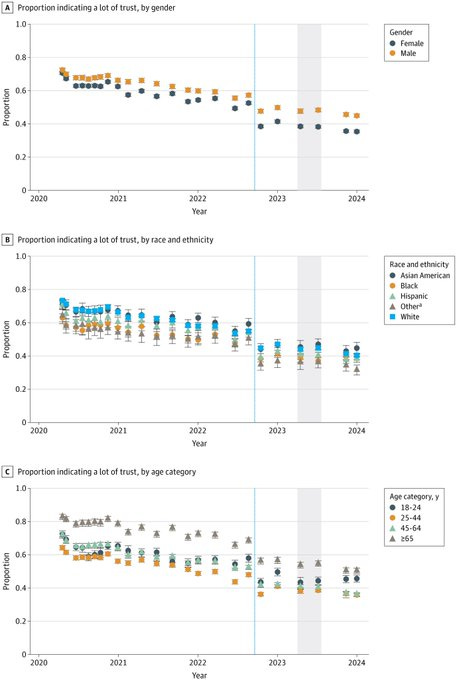
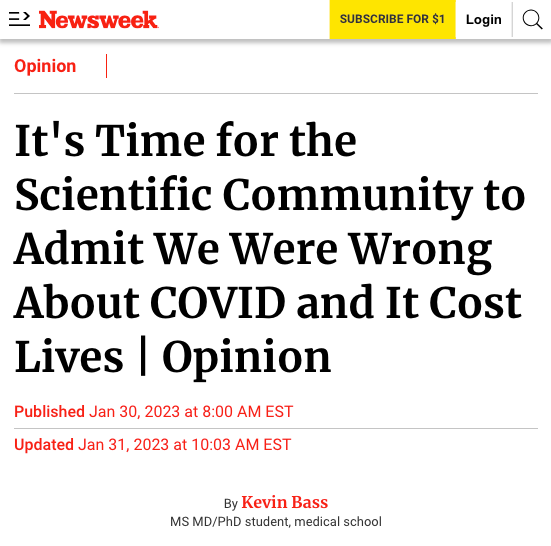
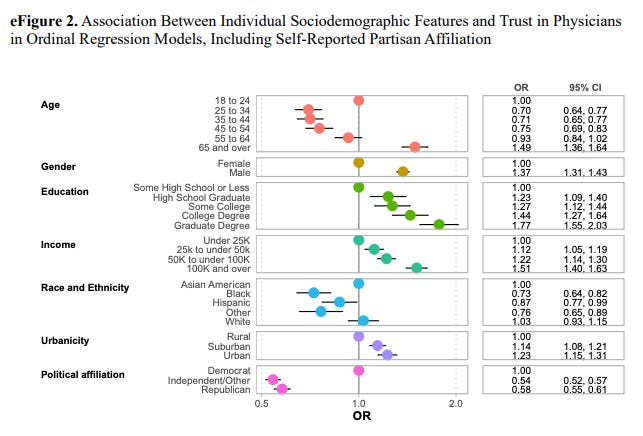
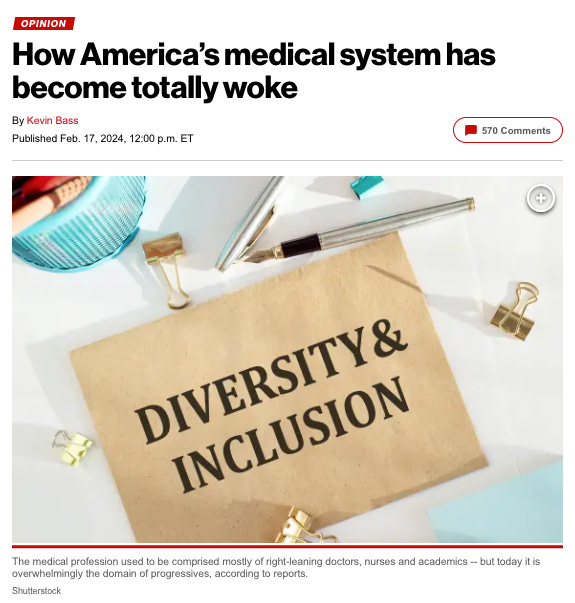
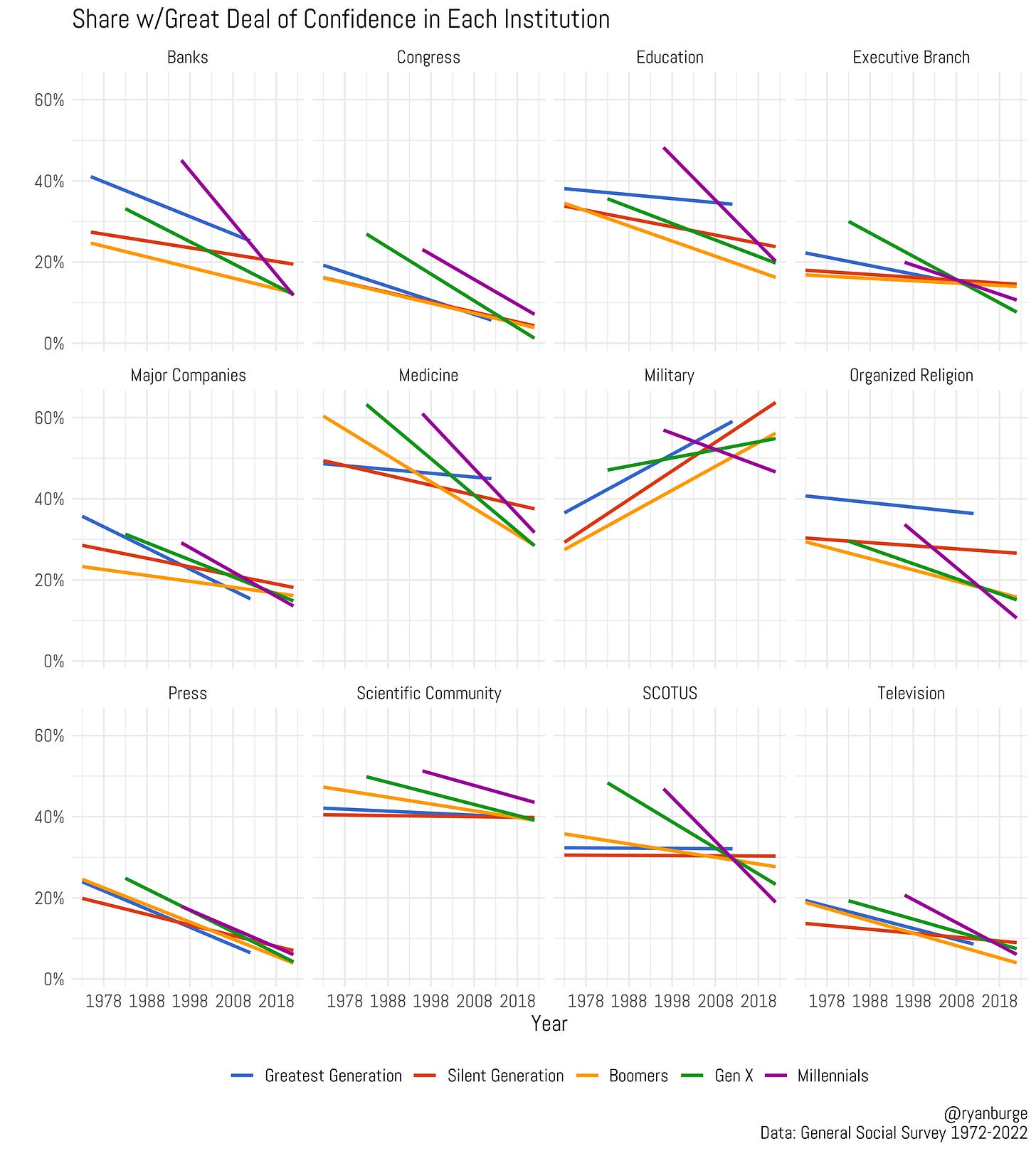

As examples of “People will stop getting the help they need” you cite:
“They will stop taking their medications, and they will stop receiving vaccinations.”
How confident are you that the trials supporting the net benefit of the majority of medicines being prescribed to and vaccines being injected into Americans are not corrupted rendering them unrepresentative of the true effects of those products?
I'm a retired medical doctor and I've lost faith in my own profession. So, it doesn't surprise me one bit that most others have as well.
And it's not a bad thing. The covid jab just repeats the history of every vaccine. After listening to the mothers of the vaccine injured instead of the gaslighting of the pediatricians, I did a deep dive on many of the others starting at the beginning with smallpox.
It's the same nightmare all over again.
I have had the time to rethink a lot of what I learned in medical school. Salt is good for you, not bad. Cholesterol is good for you, not bad. That was finally repealed in 2015 after a fifty year lie was finally exposed. Statins are bad for you, not good. Fiber is completely unnecessary. The list goes on and on.